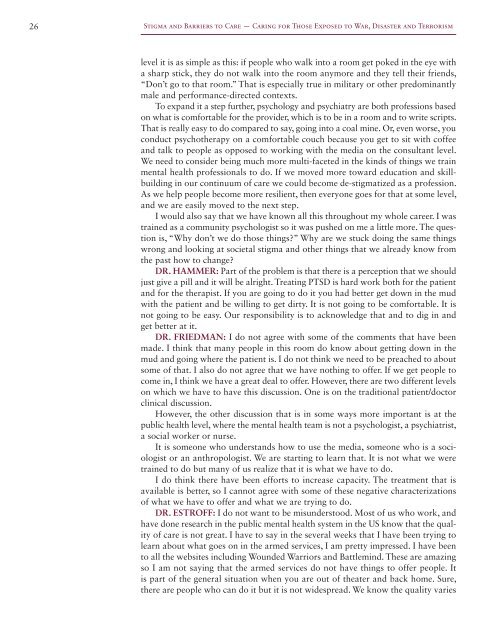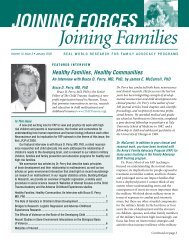stigma and barriers to care - Uniformed Services University of the ...
stigma and barriers to care - Uniformed Services University of the ...
stigma and barriers to care - Uniformed Services University of the ...
Create successful ePaper yourself
Turn your PDF publications into a flip-book with our unique Google optimized e-Paper software.
26<br />
Stigma <strong>and</strong> Barriers <strong>to</strong> Care — Caring for Those Exposed <strong>to</strong> War, Disaster <strong>and</strong> Terrorism<br />
level it is as simple as this: if people who walk in<strong>to</strong> a room get poked in <strong>the</strong> eye with<br />
a sharp stick, <strong>the</strong>y do not walk in<strong>to</strong> <strong>the</strong> room anymore <strong>and</strong> <strong>the</strong>y tell <strong>the</strong>ir friends,<br />
“Don’t go <strong>to</strong> that room.” That is especially true in military or o<strong>the</strong>r predominantly<br />
male <strong>and</strong> performance-directed contexts.<br />
To exp<strong>and</strong> it a step fur<strong>the</strong>r, psychology <strong>and</strong> psychiatry are both pr<strong>of</strong>essions based<br />
on what is comfortable for <strong>the</strong> provider, which is <strong>to</strong> be in a room <strong>and</strong> <strong>to</strong> write scripts.<br />
That is really easy <strong>to</strong> do compared <strong>to</strong> say, going in<strong>to</strong> a coal mine. Or, even worse, you<br />
conduct psycho<strong>the</strong>rapy on a comfortable couch because you get <strong>to</strong> sit with c<strong>of</strong>fee<br />
<strong>and</strong> talk <strong>to</strong> people as opposed <strong>to</strong> working with <strong>the</strong> media on <strong>the</strong> consultant level.<br />
We need <strong>to</strong> consider being much more multi-faceted in <strong>the</strong> kinds <strong>of</strong> things we train<br />
mental health pr<strong>of</strong>essionals <strong>to</strong> do. If we moved more <strong>to</strong>ward education <strong>and</strong> skillbuilding<br />
in our continuum <strong>of</strong> <strong>care</strong> we could become de-<strong>stigma</strong>tized as a pr<strong>of</strong>ession.<br />
As we help people become more resilient, <strong>the</strong>n everyone goes for that at some level,<br />
<strong>and</strong> we are easily moved <strong>to</strong> <strong>the</strong> next step.<br />
I would also say that we have known all this throughout my whole <strong>care</strong>er. I was<br />
trained as a community psychologist so it was pushed on me a little more. The question<br />
is, “Why don’t we do those things” Why are we stuck doing <strong>the</strong> same things<br />
wrong <strong>and</strong> looking at societal <strong>stigma</strong> <strong>and</strong> o<strong>the</strong>r things that we already know from<br />
<strong>the</strong> past how <strong>to</strong> change<br />
DR. HAMMER: Part <strong>of</strong> <strong>the</strong> problem is that <strong>the</strong>re is a perception that we should<br />
just give a pill <strong>and</strong> it will be alright. Treating PTSD is hard work both for <strong>the</strong> patient<br />
<strong>and</strong> for <strong>the</strong> <strong>the</strong>rapist. If you are going <strong>to</strong> do it you had better get down in <strong>the</strong> mud<br />
with <strong>the</strong> patient <strong>and</strong> be willing <strong>to</strong> get dirty. It is not going <strong>to</strong> be comfortable. It is<br />
not going <strong>to</strong> be easy. Our responsibility is <strong>to</strong> acknowledge that <strong>and</strong> <strong>to</strong> dig in <strong>and</strong><br />
get better at it.<br />
DR. FRIEDMAN: I do not agree with some <strong>of</strong> <strong>the</strong> comments that have been<br />
made. I think that many people in this room do know about getting down in <strong>the</strong><br />
mud <strong>and</strong> going where <strong>the</strong> patient is. I do not think we need <strong>to</strong> be preached <strong>to</strong> about<br />
some <strong>of</strong> that. I also do not agree that we have nothing <strong>to</strong> <strong>of</strong>fer. If we get people <strong>to</strong><br />
come in, I think we have a great deal <strong>to</strong> <strong>of</strong>fer. However, <strong>the</strong>re are two different levels<br />
on which we have <strong>to</strong> have this discussion. One is on <strong>the</strong> traditional patient/doc<strong>to</strong>r<br />
clinical discussion.<br />
However, <strong>the</strong> o<strong>the</strong>r discussion that is in some ways more important is at <strong>the</strong><br />
public health level, where <strong>the</strong> mental health team is not a psychologist, a psychiatrist,<br />
a social worker or nurse.<br />
It is someone who underst<strong>and</strong>s how <strong>to</strong> use <strong>the</strong> media, someone who is a sociologist<br />
or an anthropologist. We are starting <strong>to</strong> learn that. It is not what we were<br />
trained <strong>to</strong> do but many <strong>of</strong> us realize that it is what we have <strong>to</strong> do.<br />
I do think <strong>the</strong>re have been efforts <strong>to</strong> increase capacity. The treatment that is<br />
available is better, so I cannot agree with some <strong>of</strong> <strong>the</strong>se negative characterizations<br />
<strong>of</strong> what we have <strong>to</strong> <strong>of</strong>fer <strong>and</strong> what we are trying <strong>to</strong> do.<br />
DR. ESTROFF: I do not want <strong>to</strong> be misunders<strong>to</strong>od. Most <strong>of</strong> us who work, <strong>and</strong><br />
have done research in <strong>the</strong> public mental health system in <strong>the</strong> US know that <strong>the</strong> quality<br />
<strong>of</strong> <strong>care</strong> is not great. I have <strong>to</strong> say in <strong>the</strong> several weeks that I have been trying <strong>to</strong><br />
learn about what goes on in <strong>the</strong> armed services, I am pretty impressed. I have been<br />
<strong>to</strong> all <strong>the</strong> websites including Wounded Warriors <strong>and</strong> Battlemind. These are amazing<br />
so I am not saying that <strong>the</strong> armed services do not have things <strong>to</strong> <strong>of</strong>fer people. It<br />
is part <strong>of</strong> <strong>the</strong> general situation when you are out <strong>of</strong> <strong>the</strong>ater <strong>and</strong> back home. Sure,<br />
<strong>the</strong>re are people who can do it but it is not widespread. We know <strong>the</strong> quality varies




